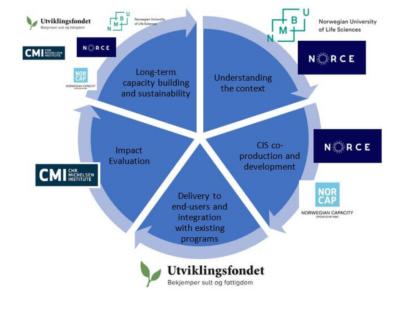Improving food security and resilience for smallholder farmers
Climate change poses a severe threat to smallholder farmers. What if they could get weather forecasts and weather-contingent agricultural advice that would make them less vulnerable to a changing climate? CMI has been awarded 23 million NOK to assess the impact of climate information services that are meant to help smallholder farmers make sustainable decisions.
In a new five-year project, CMI has partnered with NORCE, the Development Fund, NMBU and NORCAP in an effort to help smallholder farmers adjust their agricultural decisions in the face of climate change.
- Climate information services refer to reliable short-term and long-term weather forecasts combined with concrete agricultural advice, such as what farmers should grow and when they should plant, fertilize, and harvest. Agricultural decisions may be a matter of life or death to many subsistence farmers, and such services have the potential to substantially improve smallholder farmers’ resilience and food security, says Jon Einar Flåtnes, senior researcher at CMI.
Offering customized climate information services
Customized climate information services are at the very heart of the project, and the meteorological institutes in Ethiopia and Malawi, the two countries included in the project, play a key role. The consortium partners cooperate with them in producing weather forecasts that are as relevant and precise as possible. In this process, the consortium is tackling all the relevant components of the climate services value cycle:

To get the information out to the smallholder farmers, the team will use the Development Fund’s expertise in climate-smart agriculture and experience working in local communities in Ethiopia and Malawi. To ensure that the information is accessible, understandable, reliable, and trustworthy, we will use a multi-pronged approach. Making the weather forecasts available through radio and direct text or voice messages to farmers’ mobile phones is one pathway. Training and workshops where the users are taught how to make use of the information from the weather forecasts is another.
-Such training and workshops will teach farmers how to decode the different kinds of weather forecasts and put the information to practical use, says Flåtnes.
But one of the most critical aspects of ensuring direct contact with the farmers in question is the use of so-called extension agents: Government officials and semi-officials who work in the local communities. These are public representatives who work in the local communities, advising farmers on for example which crops to plant, and whether to invest in low-scale technology, for example basic irrigation systems.
-The extension agents have the contextual knowledge that is needed to give the best possible advice. They are well-known in the local communities and have established relations with the smallholder farmers in the communities where they work, says Flåtnes.
To ensure that the climate information services are of practical use to the farmers, the project aims for co-production of knowledge and user involvement. To achieve this, the partners will establish feedback loops where smallholder farmers play a key role in shaping the content and delivery of the climate information services.
-Let’s imagine that a small area of farmland has a very specific microclimate. A weather forecast for a bigger area may not be of much help to the farmers who have to grow their crops in a very specific microclimate, hence the climate information services may not be relevant to them. By establishing feedback loops, we make sure that the meteorological institutes receive information about these microclimates and can hopefully provide more precise and relevant weather forecasts, says Flåtnes.
Evaluating the impact
The partners in this joint project have different responsibilities at different stages of the climate information services cycle. While for example NMBU and NORCE are responsible for qualitative research, and NORCE and NorCap are is in charge of the technological components connected to the production of weather forecasts, the Development Fund will ensure delivery of the climate services to the local communities. CMI is responsible for assessing the impact of the climate information services.
-We will assess whether the climate information services have an actual effect on the livelihoods of the smallholder farmers. Does access to such climate information services matter to the farmers’ food security? Does the advice they get have any effect on their yield? Does it make them more resilient to environmental shocks like floods or drought? The answers to these questions will enter into the feedback loop, ensuring a continuously evolving process in producing even better results, says Flåtnes.
The research team from CMI will do a randomized controlled trial to be able to rigorously assess the impact of the climate information services.
-This will give us credible knowledge about the causal impact and tell us whether the services should be scaled up or whether changes are necessary, says Flåtnes.
Facts
- CMI, the Development Fund, NORCE, NMBU and NORCAP are partners in the project that has received a total amount of NOK 230 million from the Ministry of Foreign Affairs and Norad.
- CMI is responsible for assessing the project’s impact on farmers’ outcomes, including income and food security.
